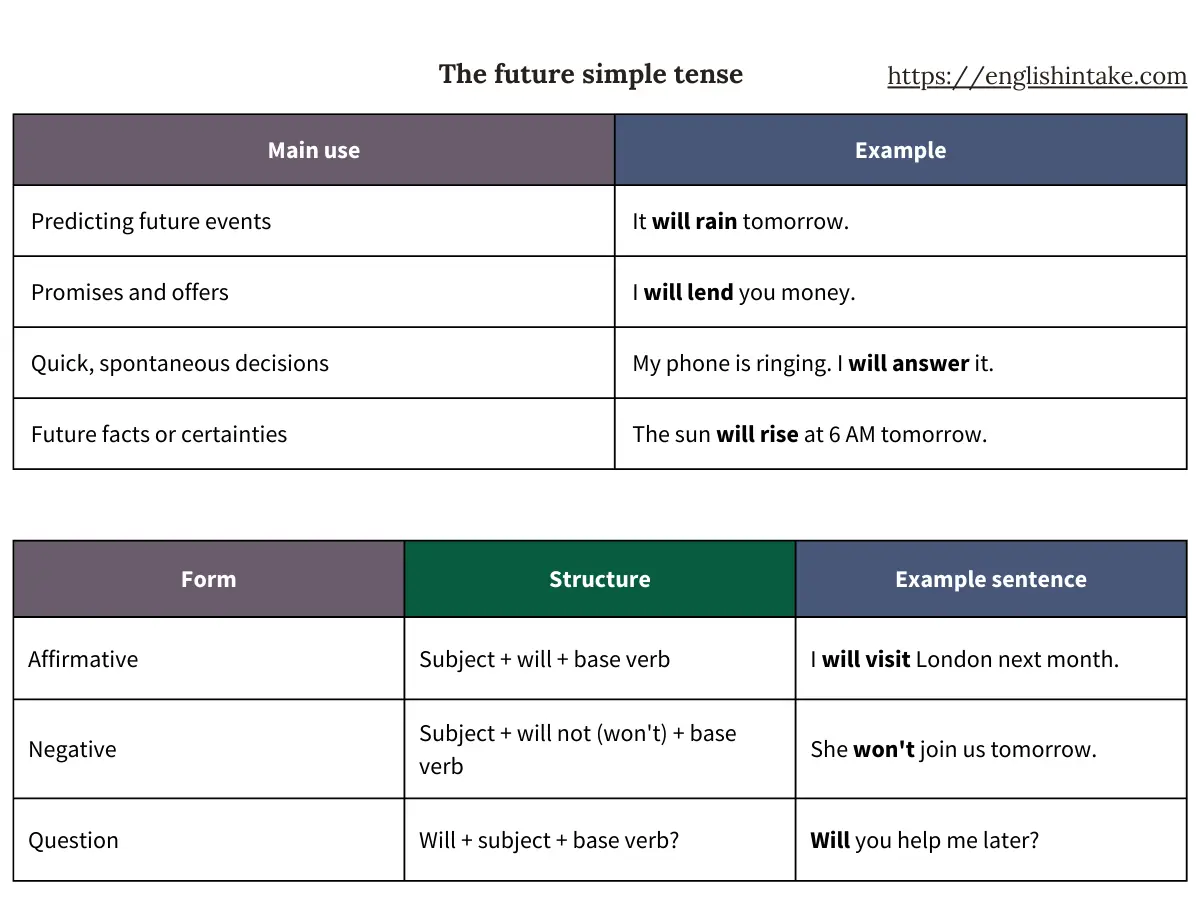Table of contents
1. What is the future simple tense?
The future simple tense describes something expected to happen later. We use it to express predictions, quick decisions, promises, or future actions.
2. Examples
- Will you join us for dinner?
- I will be here tomorrow.
- I will always love you.
- He won’t do it.
3. Forms
The structure of an affirmative sentence in the future simple tense is subject + will + verb root (infinitive without to). The contracted form of will is ’ll, which is mostly used in spoken English. Its negative form is won’t (will not).
You will become
He will become
She will become
It will become
We will become
You will become
They will become
You’ll become
He’ll become
She’ll become
It’ll become
We’ll become
You’ll become
They’ll become
You will not become
He will not become
She will not become
It will not become
We will not become
You will not become
They will not become
You won’t become
He won’t become
She won’t become
It won’t become
We won’t become
You won’t become
They won’t become
Will you become?
Will he become?
Will she become?
Will it become?
Will we become?
Will you become?
Will they staying?
Will you not become?
Will he not become?
Will she not become?
Will it not become?
Will we not become?
Will you not become?
Will they not become?
Won’t you become?
Won’t he become?
Won’t she become?
Won’t it become?
Won’t we become?
Won’t you become?
Won’t they become?
4. Use of the future simple tense
4.1 Expressing spontaneous decision
The future simple tense is used to talk about things we intend to do in the future. The decision is taken at the time of speaking.
- I left my keys at home. I’ll have to go back and get them.
- I’ve just realised that I made a mistake. I’ll have to repeat everything from the beginning.
- "Are you free next Wednesday for dinner?". "I’ll check my schedule and let you know."
- It’s noon already. I’ll grab something to eat.
- I’m feeling bored. I’ll take a walk in the park.
- I’m craving for something sweet. I’ll get some ice cream.
4.2 Expressing an opinion
The form will + verb root is often used with I think or I don’t think to express an opinion.
- I think I’ll take a day off next week.
- I don’t think I’ll be able to get up early tomorrow.
- "Talk to her. I think she’ll understand." "No, I don’t think she’ll listen to what I say."
- I don’t think she’ll give him a second chance.
- I think the weather will be nice today.
- I am sure that with practice and dedication, you will soon be proficient in English.
4.3 Asking someone to do something
The future simple tense is often used to make requests or ask someone to do something.
- Will you pick up the kids from school?
- Will you help me carry these boxes to the car?
- Will you sign this document for me, please?
- Will you please call a taxi for me?
- Will you keep an eye on the baby for a minute?
- Will you send me the report by the end of the day?
4.4 Inviting someone to do something in a polite way
The future simple tense can be used to ask someone to join in an activity or accept a request in a polite and inviting manner.
- Will you join us for a picnic in the park this weekend?
- Promise me you won’t break any rules, will you?
- Will you follow me, please? You can use If followed by will to sound even more polite. If you will follow me, please.
- If you will pardon me, I will answer your question later.
- If you will excuse me, I will come back to that point in a moment.
- You’ll have a cup of tea, won’t you?
- Will you join us for a drink tonight?
- Will you marry me?
4.5 Offering a service to someone
The future simple tense can also be used to express an offer of service or assistance to someone.
- I’ll pick you up from the airport tomorrow.
- I’ll help you carry your bags.
- I’ll take care of your dog while you are away.
- I’ll give you a lift.
- I’ll take you to the doctor tomorrow.
- I’ll drive you to the airport.
4.6 Giving commands in an annoyed way
The future simple tense can be used to express annoyance or frustration while giving commands or orders.
- Will you stop talking and listen to me?
- Will you shut up?
- You’ll turn off the TV right now and you’ll do your homework.
- Will you give me that phone and pay attention to what I say?
- You will eat your breakfast, and you will go to school.
- You will go to bed now because I told you so.
4.7 Expressing willingness or unwillingness
The future simple tense can be used to express willingness or unwillingness to do something, showing the speaker's intent or decision about doing (or not doing) a particular action in the future.
- He won’t lend you his car.
- I won’t help you with that.
- I won't let you screw up your life again.
- I promise I won't do it again.
- I’ll do my best to make her happy.
- They won’t do it for free.
- I won’t leave until you give me what I want.

5. The be going to form
The be going to construction in English expresses future plans or intentions that have already been decided or are highly likely to happen. Do not use will to talk about things that have already been decided or arranged. Instead, use be going to.
- I am going to visit my grandparents next week.
- He is going to start a new job next month.
- They are going to buy a new car.
- I am going to watch a movie tonight.
- We are going to go camping this weekend.
- They are going to start a new business.
6. Shall
Shall is a modal verb often used with the subjects "I" or "we" to make suggestions or express that something must happen or is likely to happen. To avoid ambiguity, you should use must instead of shall to impose requirements, especially in legal writing.
- Shall we go for a walk?
- We shall arrive at the airport at 5 PM.
- Shall I pick you up from the station?
- Shall I bring some snacks for the road trip?
- Shall I bring my laptop to the meeting?
- Shall I turn off the light?
- Let's dance, shall we?
7. Shall vs will
Shall is used with I or we, but will can be used with all persons. Although their difference is minor, they can have distinct meanings and can be used interchangeably depending on the context. In American English, shall may be considered too formal, old-fashioned, and too British.
- What shall happen if we don't submit the project on time? and What will happen if we don't submit the project on time? mean the same thing.
- Shall I turn off the light? (= Do you want me to turn off the light?)
- Will you turn off the light? (= I want you to turn off the light.)
- Shall we arrive at 3 pm? ( = Is 3 pm a reasonable time for us to arrive? or Do you want us to arrive at 3 pm?)
- Will we arrive at 3 pm? ( = Wondering whether we will arrive at 3 pm or not.)

